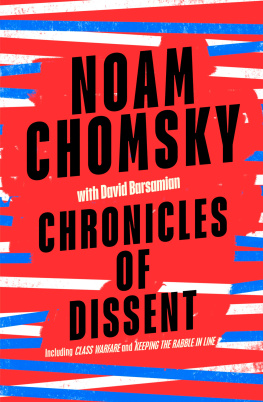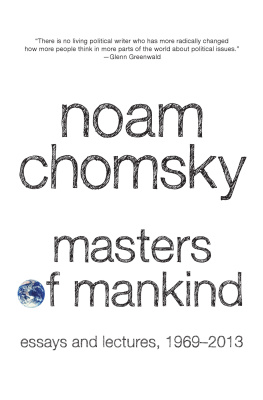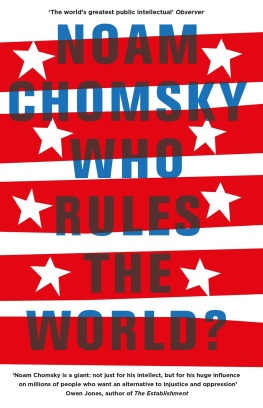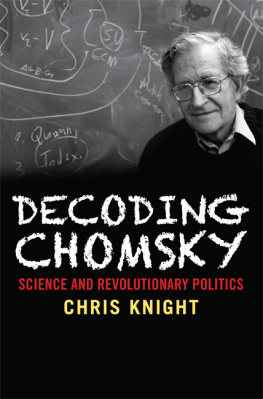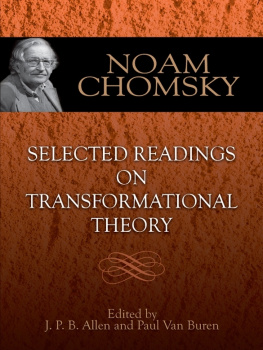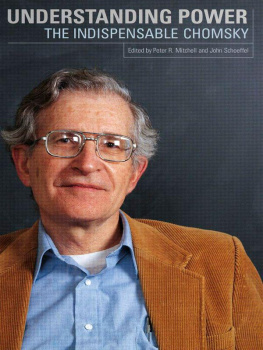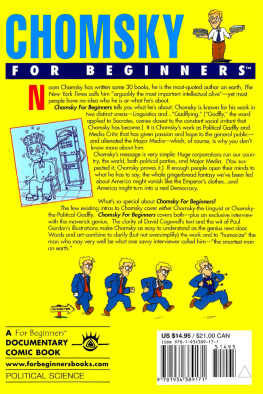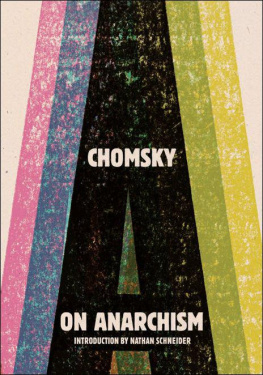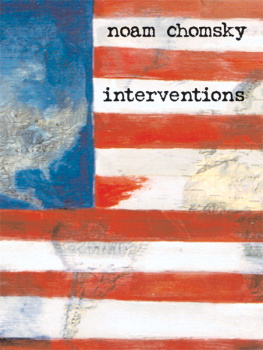2013 by Vanderbilt University Press
Nashville, Tennessee 37235
All rights reserved
First printing 2013
This book is printed on acid-free paper.
Manufactured in the United States of America
Library of Congress Cataloging-in-Publication Data on file
LC control number 2013007827
LC classification JZ1312.G74 2014
Dewey class number 327.73dc23
ISBN 978-0-8265-1947-4 (cloth)
ISBN 978-0-8265-1948-1 (paperback)
ISBN 978-0-8265-1949-8 (ebook)
Preface and Acknowledgments
PROFESSOR NOAM CHOMSKY IS A GIANT in the field of linguistics. This book is not about Chomsky the linguist. It is about Noam Chomsky the thinker-activist whose searing critiques of American foreign policy and politics have earned him a reputation as one of the worlds leading public intellectuals. I am interested in exploring and evaluating Chomskys writings on politicspolitics understood broadly to mean the workings of government, and peoples efforts to influence government, in both foreign and domestic affairs. Since the great bulk of Chomskys writings on politics have been about American foreign policy, that subject takes up most of the book.
Whatever one thinks of Chomsky, no one can deny that during the course of his nearly fifty-year career as a public intellectual he has dealt provocatively with important issues worthy of the attention of informed citizens: the Vietnam War, Americas broader international role (especially its interventions in the Third World), the structure of power in American politics, the role of the media and of intellectuals in forming public opinion, and American foreign policy in the postCold War world. My decision to write about Chomsky was motivated by the simple fact that he has written about things that I care intensely aboutthings that I think other citizens should care about as well. Ultimately, my interest is not so much in Chomsky personally as it is in his contribution to our understanding of these issues. Accordingly, this book is as much about the issues as it is about Chomskys treatment of them.
I see the reader as a partner in this search for understanding: when I use the word we I mean not the editorial we (I prefer the first person singular) but the author and the reader joined in a common effort.
Chomsky is an unusually polarizing figure. His admirers tend to be fervent and his critics fierce. It is very hard to find perspectives on Chomsky between those poles. With this book I take up a spot on that lonely middle ground. I didnt set out to arrive thereI dont necessarily believe that the truth lies somewhere in the middlebut that is where I ended up. I believe that while much of Chomskys work on politics is insightful and important, it is marred by glaring defects. Unfortunately, the value of his work can easily be obscured in the glare of those defects. I hope that a careful, balanced analysis of Chomskys deficiencies as well as his merits will help to remove the glare and thus serve to reveal what is genuinely worthwhile. I expect that this book will displease Chomsky fans and foes alike, but my objective is to serve critical readersreaders seeking not confirmation of their biases, but genuine understanding. My aim is to help such readers to see patterns in Chomskys workto see where his strengths lie, and where his reliability may be subject to doubt.
Some aspects of Chomskys political writings will not be examined here. They fall into two categories: things that I think do not require serious attention, and things that are deserving of attention but that I simply dont have room for in this book.
To take the second category first: The author of dozens of books and countless articles, Chomsky has been an amazingly prolific writer on a tremendous range of topics in politics and world affairs. A careful and truly comprehensive assessment of this corpus of work would take volumes. It would require an interdisciplinary team of social scientists and historians with expertise in several world regions. No such team is at my disposal. I have therefore had to be selective. Chomsky has written on many topics that are not treated in this book. My most important omission is Israel and Palestine, a subject about which Chomsky has written extensively and repeatedly. Many books have dealt with the respective merits of the opposing narratives in the historic conflict between Israelis and Palestinians. I dont see that I can add appreciable value to this literature in the context of this book.
The major subject in the category of things I do not believe require serious attention is Chomskys political philosophy, the outlook that he sometimes calls anarchism, sometimes libertarian socialism. This omission may seem surprising: a book about a persons analyses of politics should, presumably, include a discussion of the philosophic underpinnings of those analyses. The omission is nevertheless justified on two grounds, both reflecting my primary interest in Chomskys analyses of actually existing politics and society. First, while Chomskys anarchism reflects a radical sensibilitya conviction that existing society needs to be radically transformedit doesnt specifically inform his approach to political analysis. Unlike, say, Marxism, anarchism doesnt provide a set of theoretical constructs for or methodological approaches to political and social analysis. One can reject Chomskys radical anticapitalist perspective and still agree with most of his assumptions and conclusions about how the real world works. Second, there is simply not that much to say about Chomskys anarcho-socialism. Chomsky himself disavows any original contribution of his own to this field of thought, and he is right to do so. His vision of a libertarian socialist society, to the extent that he has described it, is both sketchy and utopianutopian in that it is unconnected to any concrete analysis of real-world possibilities.
A second omission in the unmeritorious category is the notorious Faurisson Affair. In the mid-1970s Chomsky wrote a statement in defense of the right of Robert Faurisson, a holocaust denier, to express his views. That statement showed up as a preface to a book authored by Faurisson. Chomskys culpability in this matter has been debated at length by his defenders and detractors. I see no intellectual payoff to attempting to sort out the tangle of claims and counterclaims advanced by the two sides. The issue ultimately is only relevant insofar as it bears on the charge, advanced more or less explicitly by some of his critics, that Chomsky is somehow anti-Semitic. That charge is directed at a Jew who grew up in a household immersed in Hebrew-language studies and later lived for a time on a kibbutz. It doesnt deserve serious consideration.
A final note on what this book is and is not about: It is a book about Chomskys ideas and his approach to political analysis. It is not a biography, or even an intellectual biographythe latter meaning a work that seeks consistently to place its subjects ideas in the context of his life experiences and to explain their development over time. Nor am I interested here in analyzing Chomsky psychologically. I deal with the content of his writings and ask whether they make sense. I avoid speculating about psychological motivations that might explain what he says.
I WANT TO ACKNOWLEDGE the friends and scholars who have read and commented on portions of the manuscript or have otherwise given me help and encouragement in this project: Eric Alterman, Michael Brub, Fred Block, Daniel Greco, Jack Hammond, Wallace Katz, Peter Parisi, Edward Scher, Ida Susser, Jeffrey Tannenbaum, and Michael Teitelman. I owe thanks most of all to my wife, Celia Orgel, who has always been there for me all the way.



